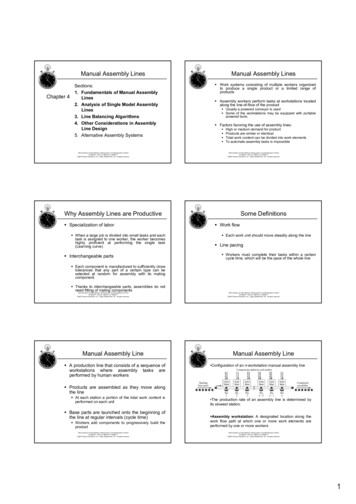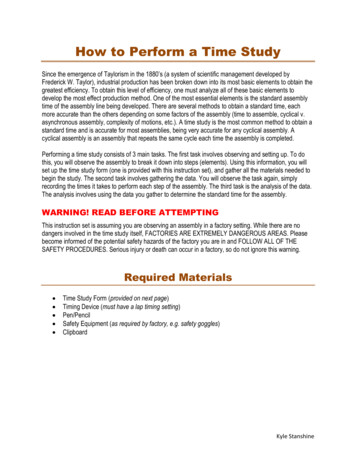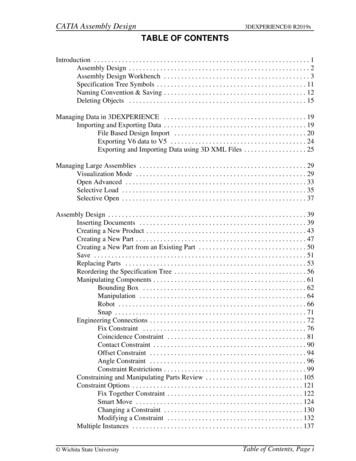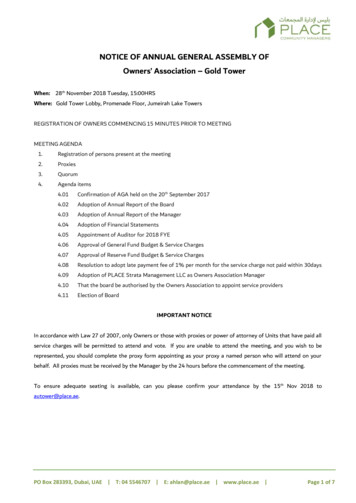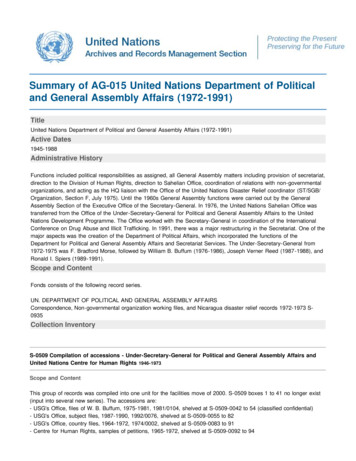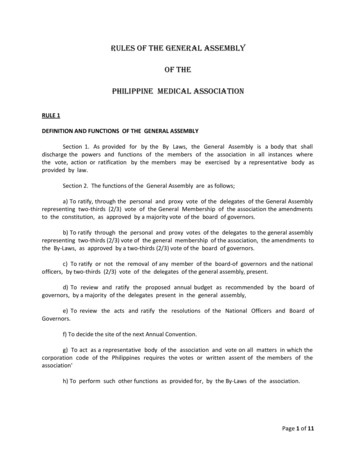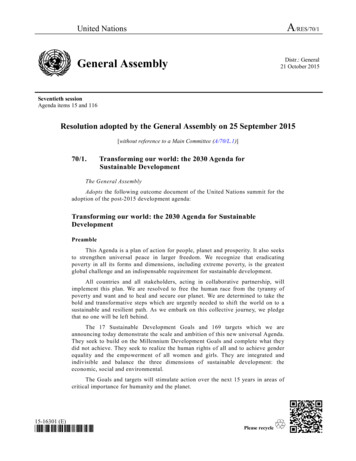
Transcription
A/RES/70/1United NationsDistr.: General21 October 2015General AssemblySeventieth sessionAgenda items 15 and 116Resolution adopted by the General Assembly on 25 September 2015[without reference to a Main Committee (A/70/L.1)]70/1.Transforming our world: the 2030 Agenda forSustainable DevelopmentThe General AssemblyAdopts the following outcome document of the United Nations summit for theadoption of the post-2015 development agenda:Transforming our world: the 2030 Agenda for SustainableDevelopmentPreambleThis Agenda is a plan of action for people, planet and prosperity. It also seeksto strengthen universal peace in larger freedom. We recognize that eradicatingpoverty in all its forms and dimensions, including extreme poverty, is the greatestglobal challenge and an indispensable requirement for sustainable development.All countries and all stakeholders, acting in collaborative partnership, willimplement this plan. We are resolved to free the human race from the tyranny ofpoverty and want and to heal and secure our planet. We are determined to take thebold and transformative steps which are urgently needed to shift the world on to asustainable and resilient path. As we embark on this collective journey, we pledgethat no one will be left behind.The 17 Sustainable Development Goals and 169 targets which we areannouncing today demonstrate the scale and ambition of this new universal Agenda.They seek to build on the Millennium Development Goals and complete what theydid not achieve. They seek to realize the human rights of all and to achieve genderequality and the empowerment of all women and girls. They are integrated andindivisible and balance the three dimensions of sustainable development: theeconomic, social and environmental.The Goals and targets will stimulate action over the next 15 years in areas ofcritical importance for humanity and the planet.15-16301 (E)*1516301*Please recycle
A/RES/70/1Transforming our world: the 2030 Agenda for Sustainable DevelopmentPeopleWe are determined to end poverty and hunger, in all their forms anddimensions, and to ensure that all human beings can fulfil their potential in dignityand equality and in a healthy environment.PlanetWe are determined to protect the planet from degradation, including throughsustainable consumption and production, sustainably managing its natural resourcesand taking urgent action on climate change, so that it can support the needs of thepresent and future generations.ProsperityWe are determined to ensure that all human beings can enjoy prosperous andfulfilling lives and that economic, social and technological progress occurs inharmony with nature.PeaceWe are determined to foster peaceful, just and inclusive societies which arefree from fear and violence. There can be no sustainable development without peaceand no peace without sustainable development.PartnershipWe are determined to mobilize the means required to implement this Agendathrough a revitalized Global Partnership for Sustainable Development, based on aspirit of strengthened global solidarity, focused in particular on the needs of thepoorest and most vulnerable and with the participation of all countries, allstakeholders and all people.The interlinkages and integrated nature of the Sustainable Development Goalsare of crucial importance in ensuring that the purpose of the new Agenda is realized.If we realize our ambitions across the full extent of the Agenda, the lives of all willbe profoundly improved and our world will be transformed for the better.2/35
Transforming our world: the 2030 Agenda for Sustainable DevelopmentA/RES/70/1DeclarationIntroduction1.We, the Heads of State and Government and High Representatives, meeting atUnited Nations Headquarters in New York from 25 to 27 September 2015 as theOrganization celebrates its seventieth anniversary, have decided today on newglobal Sustainable Development Goals.2.On behalf of the peoples we serve, we have adopted a historic decision on acomprehensive, far-reaching and people-centred set of universal and transformativeGoals and targets. We commit ourselves to working tirelessly for the fullimplementation of this Agenda by 2030. We recognize that eradicating poverty in allits forms and dimensions, including extreme poverty, is the greatest global challengeand an indispensable requirement for sustainable development. We are committed toachieving sustainable development in its three dimensions – economic, social andenvironmental – in a balanced and integrated manner. We will also build upon theachievements of the Millennium Development Goals and seek to address theirunfinished business.3.We resolve, between now and 2030, to end poverty and hunger everywhere; tocombat inequalities within and among countries; to build peaceful, just andinclusive societies; to protect human rights and promote gender equality and theempowerment of women and girls; and to ensure the lasting protection of the planetand its natural resources. We resolve also to create conditions for sustainable,inclusive and sustained economic growth, shared prosperity and decent work for all,taking into account different levels of national development and capacities.4.As we embark on this great collective journey, we pledge that no one will beleft behind. Recognizing that the dignity of the human person is fundamental, wewish to see the Goals and targets met for all nations and peoples and for allsegments of society. And we will endeavour to reach the furthest behind first.5.This is an Agenda of unprecedented scope and significance. It is accepted byall countries and is applicable to all, taking into account different national realities,capacities and levels of development and respecting national policies and priorities.These are universal goals and targets which involve the entire world, developed anddeveloping countries alike. They are integrated and indivisible and balance the threedimensions of sustainable development.6.The Goals and targets are the result of over two years of intensive publicconsultation and engagement with civil society and other stakeholders around theworld, which paid particular attention to the voices of the poorest and mostvulnerable. This consultation included valuable work done by the Open WorkingGroup of the General Assembly on Sustainable Development Goals and by the UnitedNations, whose Secretary-General provided a synthesis report in December 2014.Our vision7.In these Goals and targets, we are setting out a supremely ambitious andtransformational vision. We envisage a world free of poverty, hunger, disease andwant, where all life can thrive. We envisage a world free of fear and violence.A world with universal literacy. A world with equitable and universal access toquality education at all levels, to health care and social protection, where physical,mental and social well-being are assured. A world where we reaffirm ourcommitments regarding the human right to safe drinking water and sanitation and3/35
A/RES/70/1Transforming our world: the 2030 Agenda for Sustainable Developmentwhere there is improved hygiene; and where food is sufficient, safe, affordable andnutritious. A world where human habitats are safe, resilient and sustainable andwhere there is universal access to affordable, reliable and sustainable energy.8.We envisage a world of universal respect for human rights and human dignity,the rule of law, justice, equality and non-discrimination; of respect for race,ethnicity and cultural diversity; and of equal opportunity permitting the fullrealization of human potential and contributing to shared prosperity. A world whichinvests in its children and in which every child grows up free from violence andexploitation. A world in which every woman and girl enjoys full gender equality andall legal, social and economic barriers to their empowerment have been removed.A just, equitable, tolerant, open and socially inclusive world in which the needs ofthe most vulnerable are met.9.We envisage a world in which every country enjoys sustained, inclusive andsustainable economic growth and decent work for all. A world in whichconsumption and production patterns and use of all natural resources – from air toland, from rivers, lakes and aquifers to oceans and seas – are sustainable. One inwhich democracy, good governance and the rule of law, as well as an enablingenvironment at the national and international levels, are essential for sustainabledevelopment, including sustained and inclusive economic growth, socialdevelopment, environmental protection and the eradication of poverty and hunger.One in which development and the application of technology are climate-sensitive,respect biodiversity and are resilient. One in which humanity lives in harmony withnature and in which wildlife and other living species are protected.Our shared principles and commitments10. The new Agenda is guided by the purposes and principles of the Charter of theUnited Nations, including full respect for international law. It is grounded in theUniversal Declaration of Human Rights, 1 international human rights treaties, theMillennium Declaration 2 and the 2005 World Summit Outcome. 3 It is informed byother instruments such as the Declaration on the Right to Development. 411. We reaffirm the outcomes of all major United Nations conferences andsummits which have laid a solid foundation for sustainable development and havehelped to shape the new Agenda. These include the Rio Declaration on Environmentand Development, 5 the World Summit on Sustainable Development, the WorldSummit for Social Development, the Programme of Action of the InternationalConference on Population and Development, 6 the Beijing Platform for Action 7 andthe United Nations Conference on Sustainable Development. We also reaffirm thefollow-up to these conferences, including the outcomes of the Fourth United1Resolution 217 A (III).Resolution 55/2.3Resolution 60/1.4Resolution 41/128, annex.5Report of the United Nations Conference on Environment and Development, Rio de Janeiro, 3–14 June1992, vol. I, Resolutions Adopted by the Conference (United Nations publication, Sales No. E.93.I.8 andcorrigendum), resolution 1, annex I.6Report of the International Conference on Population and Development, Cairo, 5–13 September 1994(United Nations publication, Sales No. E.95.XIII.18), chap. I, resolution 1, annex.7Report of the Fourth World Conference on Women, Beijing, 4–15 September 1995 (United Nationspublication, Sales No. E.96.IV.13), chap. I, resolution 1, annex II.24/35
Transforming our world: the 2030 Agenda for Sustainable DevelopmentA/RES/70/1Nations Conference on the Least Developed Countries, the third InternationalConference on Small Island Developing States, the second United NationsConference on Landlocked Developing Countries and the Third United NationsWorld Conference on Disaster Risk Reduction.12. We reaffirm all the principles of the Rio Declaration on Environment andDevelopment, including, inter alia, the principle of common but differentiatedresponsibilities, as set out in principle 7 thereof.13. The challenges and commitments identified at these major conferences andsummits are interrelated and call for integrated solutions. To address themeffectively, a new approach is needed. Sustainable development recognizes thateradicating poverty in all its forms and dimensions, combating inequality within andamong countries, preserving the planet, creating sustained, inclusive and sustainableeconomic growth and fostering social inclusion are linked to each other and areinterdependent.Our world today14. We are meeting at a time of immense challenges to sustainable development.Billions of our citizens continue to live in poverty and are denied a life of dignity. Thereare rising inequalities within and among countries. There are enormous disparities ofopportunity, wealth and power. Gender inequality remains a key challenge.Unemployment, particularly youth unemployment, is a major concern. Global healththreats, more frequent and intense natural disasters, spiralling conflict, violentextremism, terrorism and related humanitarian crises and forced displacement ofpeople threaten to reverse much of the development progress made in recent decades.Natural resource depletion and adverse impacts of environmental degradation,including desertification, drought, land degradation, freshwater scarcity and loss ofbiodiversity, add to and exacerbate the list of challenges which humanity faces.Climate change is one of the greatest challenges of our time and its adverse impactsundermine the ability of all countries to achieve sustainable development. Increases inglobal temperature, sea level rise, ocean acidification and other climate changeimpacts are seriously affecting coastal areas and low-lying coastal countries, includingmany least developed countries and small island developing States. The survival ofmany societies, and of the biological support systems of the planet, is at risk.15. It is also, however, a time of immense opportunity. Significant progress hasbeen made in meeting many development challenges. Within the past generation,hundreds of millions of people have emerged from extreme poverty. Access toeducation has greatly increased for both boys and girls. The spread of informationand communications technology and global interconnectedness has great potential toaccelerate human progress, to bridge the digital divide and to develop knowledgesocieties, as does scientific and technological innovation across areas as diverse asmedicine and energy.16. Almost 15 years ago, the Millennium Development Goals were agreed. Theseprovided an important framework for development and significant progress has beenmade in a number of areas. But the progress has been uneven, particularly in Africa,least developed countries, landlocked developing countries and small islanddeveloping States, and some of the Millennium Development Goals remain offtrack, in particular those related to maternal, newborn and child health and toreproductive health. We recommit ourselves to the full realization of all theMillennium Development Goals, including the off-track Millennium DevelopmentGoals, in particular by providing focused and scaled-up assistance to least5/35
A/RES/70/1Transforming our world: the 2030 Agenda for Sustainable Developmentdeveloped countries and other countries in special situations, in line with relevantsupport programmes. The new Agenda builds on the Millennium DevelopmentGoals and seeks to complete what they did not achieve, particularly in reaching themost vulnerable.17. In its scope, however, the framework we are announcing today goes far beyondthe Millennium Development Goals. Alongside continuing development prioritiessuch as poverty eradication, health, education and food security and nutrition, it setsout a wide range of economic, social and environmental objectives. It also promisesmore peaceful and inclusive societies. It also, crucially, defines means ofimplementation. Reflecting the integrated approach that we have decided on, thereare deep interconnections and many cross-cutting elements across the new Goalsand targets.The new Agenda18. We are announcing today 17 Sustainable Development Goals with169 associated targets which are integrated and indivisible. Never before have worldleaders pledged common action and endeavour across such a broad and universalpolicy agenda. We are setting out together on the path towards sustainabledevelopment, devoting ourselves collectively to the pursuit of global developmentand of “win-win” cooperation which can bring huge gains to all countries and allparts of the world. We reaffirm that every State has, and shall freely exercise, fullpermanent sovereignty over all its wealth, natural resources and economic activity.We will implement the Agenda for the full benefit of all, for today’s generation andfor future generations. In doing so, we reaffirm our commitment to international lawand emphasize that the Agenda is to be implemented in a manner that is consistentwith the rights and obligations of States under international law.19. We reaffirm the importance of the Universal Declaration of Human Rights, aswell as other international instruments relating to human rights and internationallaw. We emphasize the responsibilities of all States, in conformity with the Charterof the United Nations, to respect, protect and promote human rights andfundamental freedoms for all, without distinction of any kind as to race, colour, sex,language, religion, political or other opinion, national or social origin, property,birth, disability or other status.20. Realizing gender equality and the empowerment of women and girls will makea crucial contribution to progress across all the Goals and targets. The achievementof full human potential and of sustainable development is not possible if one half ofhumanity continues to be denied its full human rights and opportunities. Women andgirls must enjoy equal access to quality education, economic resources and politicalparticipation as well as equal opportunities with men and boys for employment,leadership and decision-making at all levels. We will work for a significant increasein investments to close the gender gap and strengthen support for institutions inrelation to gender equality and the empowerment of women at the global, regionaland national levels. All forms of discrimination and violence against women andgirls will be eliminated, including through the engagement of men and boys. Thesystematic mainstreaming of a gender perspective in the implementation of theAgenda is crucial.21. The new Goals and targets will come into effect on 1 January 2016 and willguide the decisions we take over the next 15 years. All of us will work to implementthe Agenda within our own countries and at the regional and global levels, takinginto account different national realities, capacities and levels of development andrespecting national policies and priorities. We will respect national policy space for6/35
Transforming our world: the 2030 Agenda for Sustainable DevelopmentA/RES/70/1sustained, inclusive and sustainable economic growth, in particular for developingStates, while remaining consistent with relevant international rules and commitments.We acknowledge also the importance of the regional and subregional dimensions,regional economic integration and interconnectivity in sustainable development.Regional and subregional frameworks can facilitate the effective translation ofsustainable development policies into concrete action at the national level.22. Each country faces specific challenges in its pursuit of sustainabledevelopment. The most vulnerable countries and, in particular, African countries,least developed countries, landlocked developing countries and small islanddeveloping States, deserve special attention, as do countries in situations of conflictand post-conflict countries. There are also serious challenges within many middleincome countries.23. People who are vulnerable must be empowered. Those whose needs arereflected in the Agenda include all children, youth, persons with disabilities (ofwhom more than 80 per cent live in poverty), people living with HIV/AIDS, olderpersons, indigenous peoples, refugees and internally displaced persons andmigrants. We resolve to take further effective measures and actions, in conformitywith international law, to remove obstacles and constraints, strengthen support andmeet the special needs of people living in areas affected by complex humanitarianemergencies and in areas affected by terrorism.24. We are committed to ending poverty in all its forms and dimensions, includingby eradicating extreme poverty by 2030. All people must enjoy a basic standard ofliving, including through social protection systems. We are also determined to endhunger and to achieve food security as a matter of priority and to end all forms ofmalnutrition. In this regard, we reaffirm the important role and inclusive nature ofthe Committee on World Food Security and welcome the Rome Declaration onNutrition and the Framework for Action. 8 We will devote resources to developingrural areas and sustainable agriculture and fisheries, supporting smallholder farmers,especially women farmers, herders and fishers in developing countries, particularlyleast developed countries.25. We commit to providing inclusive and equitable quality education at alllevels – early childhood, primary, secondary, tertiary, technical and vocationaltraining. All people, irrespective of sex, age, race or ethnicity, and persons withdisabilities, migrants, indigenous peoples, children and youth, especially those invulnerable situations, should have access to life-long learning opportunities thathelp them to acquire the knowledge and skills needed to exploit opportunities and toparticipate fully in society. We will strive to provide children and youth with anurturing environment for the full realization of their rights and capabilities, helpingour countries to reap the demographic dividend, including through safe schools andcohesive communities and families.26. To promote physical and mental health and well-being, and to extend lifeexpectancy for all, we must achieve universal health coverage and access to qualityhealth care. No one must be left behind. We commit to accelerating the progressmade to date in reducing newborn, child and maternal mortality by ending all suchpreventable deaths before 2030. We are committed to ensuring universal access tosexual and reproductive health-care services, including for family planning,information and education. We will equally accelerate the pace of progress made infighting malaria, HIV/AIDS, tuberculosis, hepatitis, Ebola and other communicablediseases and epidemics, including by addressing growing anti-microbial resistance8World Health Organization, document EB 136/8, annexes I and II.7/35
A/RES/70/1Transforming our world: the 2030 Agenda for Sustainable Developmentand the problem of unattended diseases affecting developing countries. We arecommitted to the prevention and treatment of non-communicable diseases, includingbehavioural, developmental and neurological disorders, which constitute a majorchallenge for sustainable development.27. We will seek to build strong economic foundations for all our countries.Sustained, inclusive and sustainable economic growth is essential for prosperity.This will only be possible if wealth is shared and income inequality is addressed.We will work to build dynamic, sustainable, innovative and people-centredeconomies, promoting youth employment and women’s economic empowerment, inparticular, and decent work for all. We will eradicate forced labour and humantrafficking and end child labour in all its forms. All countries stand to benefit fromhaving a healthy and well-educated workforce with the knowledge and skills neededfor productive and fulfilling work and full participation in society. We willstrengthen the productive capacities of least developed countries in all sectors,including through structural transformation. We will adopt policies which increaseproductive capacities, productivity and productive employment; financial inclusion;sustainable agriculture, pastoralist and fisheries development; sustainable industrialdevelopment; universal access to affordable, reliable, sustainable and modern energyservices; sustainable transport systems; and quality and resilient infrastructure.28. We commit to making fundamental changes in the way that our societiesproduce and consume goods and services. Governments, international organizations,the business sector and other non-State actors and individuals must contribute tochanging unsustainable consumption and production patterns, including through themobilization, from all sources, of financial and technical assistance to strengthendeveloping countries’ scientific, technological and innovative capacities to movetowards more sustainable patterns of consumption and production. We encouragethe implementation of the 10-Year Framework of Programmes on SustainableConsumption and Production Patterns. All countries take action, with developedcountries taking the lead, taking into account the development and capabilities ofdeveloping countries.29. We recognize the positive contribution of migrants for inclusive growth andsustainable development. We also recognize that international migration is amultidimensional reality of major relevance for the development of countries oforigin, transit and destination, which requires coherent and comprehensiveresponses. We will cooperate internationally to ensure safe, orderly and regularmigration involving full respect for human rights and the humane treatment ofmigrants regardless of migration status, of refugees and of displaced persons. Suchcooperation should also strengthen the resilience of communities hosting refugees,particularly in developing countries. We underline the right of migrants to return totheir country of citizenship, and recall that States must ensure that their returningnationals are duly received.30. States are strongly urged to refrain from promulgating and applying anyunilateral economic, financial or trade measures not in accordance with internationallaw and the Charter of the United Nations that impede the full achievement ofeconomic and social development, particularly in developing countries.31. We acknowledge that the United Nations Framework Convention on ClimateChange 9 is the primary international, intergovernmental forum for negotiating theglobal response to climate change. We are determined to address decisively thethreat posed by climate change and environmental degradation. The global nature of98/35United Nations, Treaty Series, vol. 1771, No. 30822.
Transforming our world: the 2030 Agenda for Sustainable DevelopmentA/RES/70/1climate change calls for the widest possible international cooperation aimed ataccelerating the reduction of global greenhouse gas emissions and addressingadaptation to the adverse impacts of climate change. We note with grave concernthe significant gap between the aggregate effect of parties’ mitigation pledges interms of global annual emissions of greenhouse gases by 2020 and aggregateemission pathways consistent with having a likely chance of holding the increase inglobal average temperature below 2 degrees Celsius, or 1.5 degrees Celsius abovepre-industrial levels.32. Looking ahead to the twenty-first session of the Conference of the Parties inParis, we underscore the commitment of all States to work for an ambitious anduniversal climate agreement. We reaffirm that the protocol, another legal instrumentor agreed outcome with legal force under the Convention applicable to all partiesshall address in a balanced manner, inter alia, mitigation, adaptation, finance,technology development and transfer and capacity-building; and transparency ofaction and support.33. We recognize that social and economic development depends on thesustainable management of our planet’s natural resources. We are thereforedetermined to conserve and sustainably use oceans and seas, freshwater resources,as well as forests, mountains and drylands and to protect biodiversity, ecosystemsand wildlife. We are also determined to promote sustainable tourism, to tackle waterscarcity and water pollution, to strengthen cooperation on desertification, duststorms, land degradation and drought and to promote resilience and disaster riskreduction. In this regard, we look forward to the thirteenth meeting of the Conferenceof the Parties to the Convention on Biological Diversity to be held in Mexico.34. We recognize that sustainable urban development and management are crucialto the quality of life of our people. We will work with local authorities andcommunities to renew and plan our cities and human settlements so as to fostercommunity cohesion and personal security and to stimulate innovation andemployment. We will reduce the negative impacts of urban activities and of chemicalswhich are hazardous for human health and the environment, including through theenvironmentally sound management and safe use of chemicals, the reduction andrecycling of waste and the more efficient use of water and energy. And we will workto minimize the impact of cities on the global climate system. We will also takeaccount of population trends and projections in our national rural and urbandevelopment strategies and policies. We look forward to the upcoming United NationsConference on Housing and Sustainable Urban Development to be held in Quito.35. Sustainable development cannot be realized without peace and security; andpeace and security will be at risk without sustainable development. The new Agendarecognizes the need to build peaceful, just and inclusive societies that provide equalaccess to justice and that are based on respect for human rights (including the rightto development), on effective rule of law and good governance at all levels and ontransparent, effective and accountable institutions. Factors which give rise toviolence, insecurity and injustice, such as inequality, corruption, poor governanceand illicit financial and arms flows, are addressed in the Agenda. We must redoubleour efforts to resolve or prevent conflict and to support post-conflict countries,including through ensuring that women have a role in peacebuilding and Statebuilding. We call for further effective measures and actions to be taken, inconformity with international law, to remove the obstacles to the full realization ofthe right of self-determination of peoples living under colonial and foreignoccupation, which continue to adversely affect their economic and socialdevelopment as well as their environment.9/35
A/RES/70/1Transforming our world: the 2030 Agenda for Sustainable Development36. We pledge to foster intercultural understanding, tolerance, mutual
General Assembly Distr.: General 21 October 2015 Seventieth session Agenda items 15 and 116 15-16301 (E) *1516301* Please recycle Resolution adopted by the General Assembly on 25 September 2015 .
